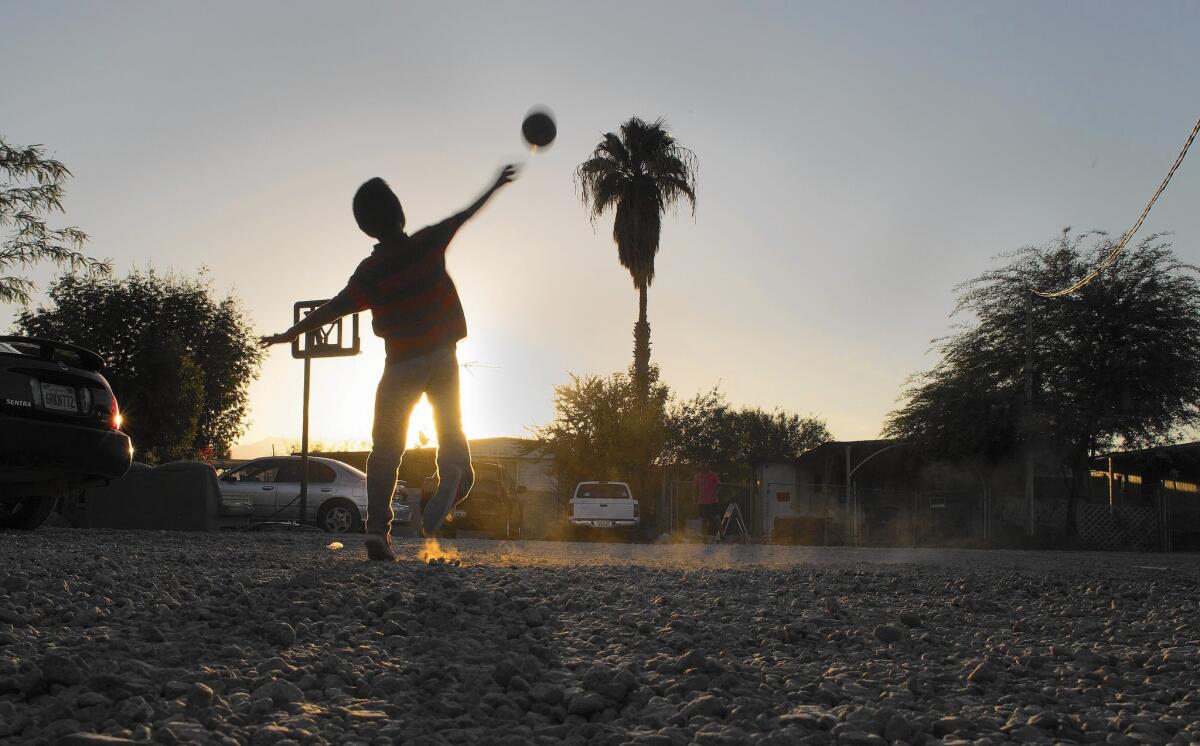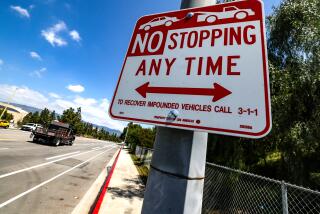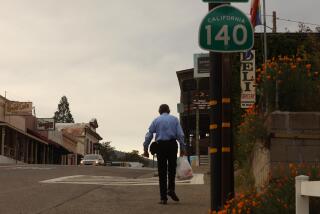Farmworkers find a bumper crop of squalor in Coachella Valley trailer parks

At St. Anthony’s trailer park in Mecca, the nonprofit Pueblo Unido stepped in as owner to make improvements, but residents are frustrated with the slow progress. Above, Aaron Gonzalez, 11, tosses a football.
When five farmworker families pooled their money to build the Don Jose Mobile Home Park on a plot of dusty land here, they knew little about building permits.
So they jury-rigged almost everything: Electricity was tapped from a post meant to power one well, the dirt road was covered in rugs to keep down the choking dust.
Twenty years later, some things have improved. But the park is still without permits. Its 55 residents live in aging trailers and cope with prolonged power outages. Their dirt road turns to pools of mud when it rains.
------------
FOR THE RECORD:
Trailer parks: In the Oct. 6 Section A, an article about makeshift trailer parks in the Coachella Valley said that the legal services group California Rural Legal Assistance Inc. was part of an online campaign to raise funds to buy a mobile home park in Thermal. The group was involved in litigation against the park’s owners but is not part of the fundraising campaign.
------------
But its manicured lawns, whitewashed iron gate and carefully tended rose bushes signal that despite its flaws, it is home.
This part of the Coachella Valley, with its abundant agricultural fields, is dotted with unpermitted mobile home parks, housing thousands of farmworkers in dozens of tiny neighborhoods that were never designed to be permanent.
What to do about them has long vexed county officials. There have been attempts to shut the worst ones. But as one county official said, “there’s just too many, quite simply,” to start closing them down — and, crucially, not enough alternative low-cost housing.
Now, county officials along with some non-profits are working to give some permanence to this makeshift housing, with projects like paving roads and making permits easier to get.
But each is costly and complicated, and long-term fixes — such as connecting parks to regional sewer and water lines — seem far out of reach.
“How long has it been like this, since the ‘60s?” asked Michele Hasson, a local organizer for a non-profit group that works with low-income communities. “It’s like the abyss of the Valley. We get left out of the California dream.”
Exactly how many unpermitted parks are in the region is difficult to determine, but there are dozens if not more than 100, county officials and activists say.
Safety problems and lack of infrastructure can be overwhelming. Tap water, taken from wells, is sometimes tainted by arsenic and unsafe levels of cancer-causing chromium 6. Power outages are common, sewage systems are frequently inadequate and trailers often crowded and crumbling.
Because of this, some advocates say it’s best to start fresh with new housing. But resources are scarce.
Three years ago, the 181-unit Mountain View Estates — featuring tidy homes with modern amenities, a soccer field and playground — was opened to house the residents of Duroville, a squalid mobile home park that was closed by a federal judge.
“You would think, if we could just replicate the model for building a 181-unit park elsewhere that would be ideal,” said John Aguilar, deputy director of the Riverside County Housing Authority.
But the project cost about $28 million, cobbled together with “multiple layers” of grant funding, including redevelopment money (which no longer exists), federal funds and a developer’s investment. Residents of such parks typically pay $150 to $400 a month in rent.
“It’s just really, really difficult … to build parks of that size again,” Aguilar said.
Sergio Carranza, executive director of the nonprofit Pueblo Unido Community Development Corp., said a better model is to invest to help residents and owners bring parks up to code.
Some owners are slumlords who don’t care to fix their properties, he said. But in his experience, many more are low-wage farmworkers who simply don’t have the means or know-how to comply with complicated regulations.
“These families with the little income they have as farmworkers have managed to invest in land and mobile homes, but they never got assistance to properly do it,” he said. “There is no question that they want to do improvements.”
Heidi Marshall, director of the county housing authority, said Riverside County has changed its approach to unpermitted parks. In 2000, allegations that the county was targeting Latino-owned and occupied parks for closure resulted in a $21-million settlement to improve farmworker housing, most of which was used to build three housing projects and a service center.
“The shutting-them-down approach, I think, was something that was done because that’s what the laws required, instead of having an overall approach that would truly help both the county achieve its goals and the families have affordable housing,” she said. “I think we’re on the right path now.”
Since last year, the county has taken steps to improve conditions for people living in existing parks.
To address one of the biggest problems — prolonged outages caused by makeshift power systems — officials authorized the use of temporary construction power lines to return power.
The county has also undertaken a $3.4-million project to pave dirt roads at 35 parks.
This year, the county will make standardized designs for septic, electric, water and fire-suppression systems available to small park owners. The plans, which would create something of a blueprint for permits, eliminate the need for each owner to hire engineers and streamline a part of the permitting process that many found overwhelming.
“We kind of all seized on the idea that if we had a standard plan, or a cookbook, to make this work, that would allow these owners to allow the process to move forward,” said Bob Lyman, regional office manager for the Riverside County Transportation & Land Management Agency.
But even with the changes, fixes are expensive and difficult.
This summer, residents of the neglected Shady Lane Mobilehome Park in Thermal, teamed up with students at UC Irvine School of Law and the legal services group California Rural Legal Assistance Inc. to launch an online campaign to raise $225,000 to buy the park from its owner so they can make improvements.
The park, which houses 34 farmworkers and their families, has dilapidated homes and frequent outages. Water shutdowns are common, and septic systems often overflow.
With four days left in its online campaign, the group had raised only $6,587.
At St. Anthony’s Park, which has more than 100 trailers in Mecca, Pueblo Unido, the nonprofit, stepped in as owner to make improvements, but with changes coming slowly, many are frustrated.
Carranza said the group simply doesn’t have the money to make changes faster. State and federal funds for a $3.2-million project to connect the park to a regional sewer line, set to begin construction next year, took years to secure, he said.
At Don Jose park, the needs are great: This summer, a storm cut power to the park, leaving residents without electricity for four days while some slept in tents to escape suffocating triple-digit heat. The same storm knocked the roof off one aging trailer, and its owner can’t afford to replace it.
Even so, there are signs of improvement. County workers recently flattened the dirt road to prepare it for paving, which should be complete in the next few weeks. And residents are determined to finally get permits.
Carranza, who is helping the families, believes the process will cost $75,000 to $125,000, which includes, among other costs, installation of a fire-suppression system, electrical upgrades and a contractor to oversee the work. Already they have paid thousands in back payments for things such as electricity.
The costs are impossible to pay without help, Cervera said. So the families are hoping they can get access to low-cost loans or grants.
There was a time, residents said, when they thought they might get kicked off the land. But projects such as the paving make them think that threat has passed.
Now, Cervera said, “there’s got to be some help for those of us who want to make things right.”
Twitter: @palomaesquivel
ALSO
State high court set to hear arguments on Citizens United advisory measure
Californians’ love of class-action lawsuits to be tested by Supreme Court
Lawsuit seeks to block a condo project where Marilyn Monroe once lived
More to Read
Start your day right
Sign up for Essential California for news, features and recommendations from the L.A. Times and beyond in your inbox six days a week.
You may occasionally receive promotional content from the Los Angeles Times.







